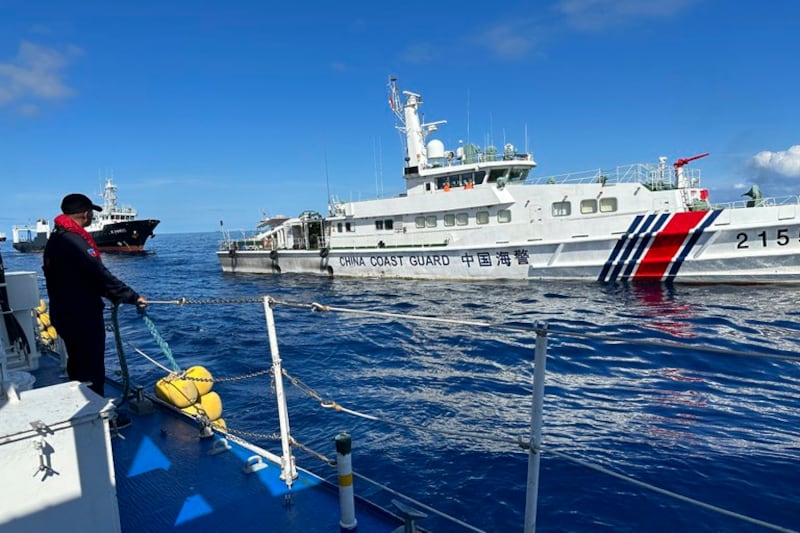Laos, a land-locked country, has taken over the rotating chair of the Association of Southeast Asian Nations with one of the major tasks in 2024 being to moderate the complex situation in the South China Sea.
Analysts say Vientiane is likely to try its best to stay neutral and strike a compromise between disputing parties.
“Laos is a reactive ASEAN chair and not a proactive one,” said Carlyle Thayer, a Southeast Asia specialist, noting that Laos and Myanmar were the only two ASEAN members who did not submit draft Codes of Conduct to make up the Single Draft Negotiating Text released in August 2018.
ASEAN and China have been negotiating a legally-binding Code of Conduct after reaching an initial Declaration of Conduct of Parties in the South China Sea in 2002. In 2018, the regional bloc and Beijing managed to release the Single Draft Negotiating Text – or a draft agreement – but progress has been stalled.
China claims historical rights to almost 90% of the South China Sea, an area roughly demarcated by the so-called “nine-dash line.” Other claimants, including ASEAN members Brunei, Malaysia, the Philippines and Vietnam, have rejected those claims and a 2016 international arbitration tribunal ruled that they had no legal basis.
Meanwhile tension has been rising in recent months between Beijing and Manila over some atolls claimed by both countries.

In 2023, under Indonesia's chairmanship, there were efforts by ASEAN to once again accelerate the negotiating process, but it may stall again with Laos in the hot seat this year.
"Laos' indebtedness to China will impede any efforts to resume negotiations over competing maritime claims in the South China Sea," said an assessment by Stratfor, a geopolitical intelligence firm.
“Laos is unlikely to make progress on restarting talks over the Code of Conduct due to its weak negotiating position, as it owes China billions of dollars related to infrastructure projects and is in the midst of an economic crisis, and its neutral stake in the matter as a landlocked country beholden to both China and ASEAN,” said the Stratfor report.
Middle ground
The theme of Laos' 2024 ASEAN year is "ASEAN: Enhancing Connectivity and Resilience" and the focus will be "leading ASEAN to promote the community building and enhancing a connected and resilient ASEAN community," a report by the state-run Vietnam News Agency paraphrased Lao Deputy Prime Minister and Minister of Foreign Affairs Saleumxay Kommasith as saying on Nov. 17.
Laos' external debt was about U.S. $14.5 billion in 2022. The World Bank said in a country report in November 2023 that China accounted for about half of the external public debt stock in 2022 and for about half of external debt repayments scheduled for 2024-2027.
Vientiane also does not want to upset other ASEAN members, especially Vietnam, its immediate neighbor and traditional ally. Hanoi, as a claimant in the South China Sea, has been at odds with China over a number of issues, from the building of artificial islands to the exploitation of natural resources.
Lao Prime Minister Sonexay Siphandone visited Hanoi in early January.
During a meeting with his Vietnamese counterpart, the two prime ministers emphasized the importance of maintaining peace, security and stability in the region, including maintaining ASEAN's solidarity, common stance and centrality in regional security and strategic issues, such as the East Sea [South China Sea] issue, according to the Vietnamese government's website.
“Vietnam is keen to lobby Laos on the South China Sea,” said Canberra-based Carlyle Thayer.
“I was leaked the transcript of the ASEAN Ministerial retreat in 2012 when Cambodia was ASEAN Chair and quashed the joint statement because of its paragraphs on the South China Sea,” Thayer told Radio Free Asia (RFA).
“As ministers discussed the draft joint statement in alphabetical order, Laos said virtually nothing or on the South China Sea said it would accept whatever the other members decided.”
Yet the previous time Laos was ASEAN chair in 2016, it orchestrated a generic joint communiqué on the South China Sea that said "maintaining peace and stability in the South China Sea region serves the fundamental interests of ASEAN member states and China, as well as the international community."
While this could be seen as passing the South China Sea dilemma to the next chair, it was a step up from the failure to issue a joint communiqué in 2012 by Cambodia and Vientiane is likely to maintain this approach this year.
Edited by Mike Firn and Elaine Chan.
